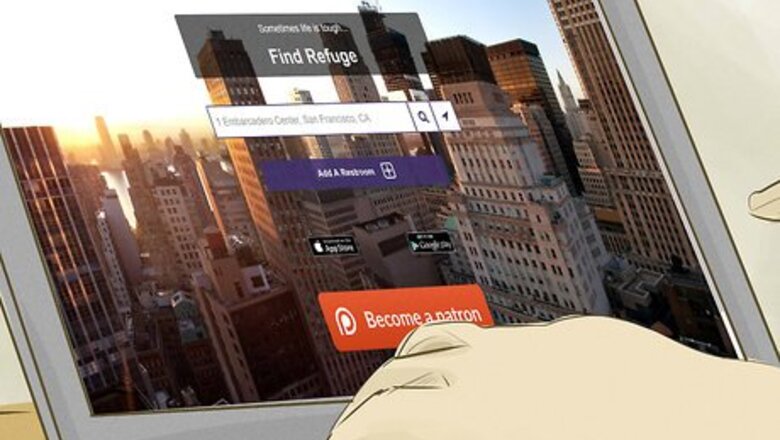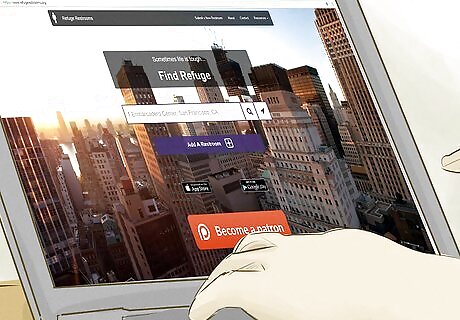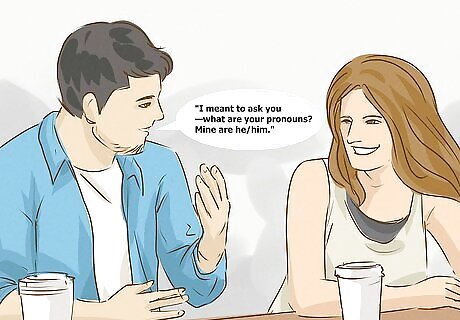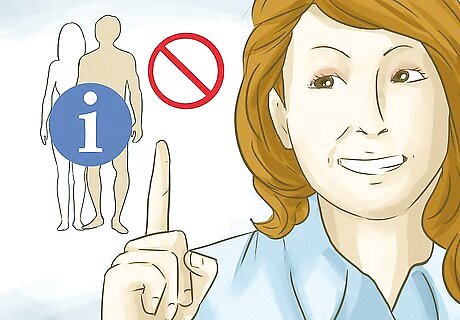
views
X
Expert Source
Marissa Floro, PhDCounseling Psychologist
Expert Interview. 18 February 2021.
Dating a Transgender Person for the First Time

Pick a location where your date feels comfortable. Meet your date in a location of their choosing, or ask them to approve of the location you've chosen. If you are choosing the location, opt for a café, bar, or restaurant with single-stall or all-gender restrooms. These tend to be safer for trans people to use. Don't overthink it! Just run a place by your date, and if they accept, it's probably a good place for them. If you don't know of any place near you that has a single-use or all-gender restroom, check Refuge Restrooms: https://www.refugerestrooms.org/

Use the right pronouns. Use the gendered language that fits your date. If your date is a transgender woman, she will probably use "she/her" pronouns. If your date is a transgender man, he will probably be "he/him." If your date is nonbinary, they may prefer "they/them" or other pronouns. If you aren't sure what pronouns your date uses, first listen. If someone else who knows them well uses a pronoun, that is probably the correct one to use. You can also wait to see how your date refers to themself. If you don't find out by listening, just tell them your pronouns and ask for theirs. You might say, "I meant to ask you—what are your pronouns? Mine are he/him." Until you know for sure, just avoid using a pronoun. Use your date's name instead.

Get to know your date as a person. Just like when you're dating a cis person, the important thing is to get a sense of your date as a whole person. Ask your date what they do for fun, what their hopes and dreams are, and what they do for work. Open up about yourself as well, and find out what you have in common.

Communicate before you engage in physical intimacy. If you are about to engage in sexual activity of any sort, ask your date to talk with you about what's about to happen. Your date may have particular ways they prefer to be touched. You may have questions about how to touch them. If there's anything you aren't sure about, just ask. For instance, you might say, "I'd like to go further, but will you tell me what you like before we do?" Ask if there are any parts of their body they don't want you to touch. Some people, including trans people, dislike touch on certain areas of their bodies, such as the back, chest, or genitals. Ask them what language they want you to use about their body. Your date may be comfortable in their body, but uncomfortable using certain words for it. For instance, a trans man might like it when you touch his chest, so long as you say "pecs" instead of "breasts." Ask, or just listen to the words they use and mirror them.

Apologize and move on if you make a mistake. If you slip up and say the wrong pronoun, if you ask a question that offends your date, or if you make any other small mistake, just correct yourself and apologize. Then move on. Don't agonize over it! If you keep apologizing and bringing it up, you'll embarrass your date and make them feel like they need to comfort you. For instance, if your date is a trans man and you call him a "girl" by accident, say "guy, I mean. I'm sorry." If you don't realize you misgendered someone until much later, use your best judgment. Some people would prefer an apology, but others would rather you drop it. If your date is truly upset, accept it. Sometimes we hurt people even when we mean well. Let your date have whatever space they ask for.
Avoiding Common Etiquette Mistakes

Don't compliment them on their gender presentation. When a transgender person looks cisgender, this is referred to as "passing." While many trans people want to pass, for safety and other reasons, they probably don't want to be randomly complimented on how well they pass. Complimenting your date in this way will make them feel like you are focusing too much on their gender. Compliments like "You're so masculine/feminine!" or "You look just like a cisgender woman/man!" are likely to offend your date. If you're a cisgender woman on a date with a transgender woman, a comment like "Wow, you are so much better at makeup than I am" is likely to come off as condescending. This doesn't mean you can't compliment your date on their looks or their style! Just do so without comparing them to cis people. Everyone likes being told, "You look amazing in that new jacket! You're such a sharp dresser!"

Wait to discuss topics that are too personal. As with any other date, you should be sensitive about what kinds of questions you ask. Don't ask questions that are inappropriate early in a relationship. If you are curious about your date's body, transition, or sexual history, wait for your date to bring it up. In general, don't ask a transgender person what sorts of surgery or hormonal treatment they have had. If they want to discuss it, they'll bring it up. While some trans people are comfortable discussing these topics with friends, most will not want to discuss them with a new acquaintance.

Avoid asking about their pre-transition life unless they bring it up. You may be curious about what your date used to look like, and what their life was like before they transitioned. However, asking this can make your date feel like you are only interested in them because of their transition. It can also bring up a lot of painful memories for some people. Don't ask them what their former name was, and never use it to refer to them. Using a trans person's former name is called "deadnaming," and it can be very hurtful. If you knew your date before they transitioned, be sensitive about what parts of your shared history you bring up. Talk about things you did together that were not gender-determined.

Remember that your date does not need you to reassure them. Avoid the temptation to tell your date you are "okay" with them being transgender or that you think it's admirable or "cool." You can show that you are "okay" or that you admire your date just by treating them with respect. Telling them you are "okay" with it sounds like you are asking them to thank you for respecting them. Similarly, telling your date out of nowhere that they are "brave" may come off as condescending. Your date does not want you to randomly tell them that you "don't think of them as trans." They are trans. There's nothing shameful about it.
Becoming an Ally to Your Trans Partner

Identify your date clearly when you introduce them. Communicate your date's name and gender when you introduce them. This will lower the chance that someone will use the wrong words to describe them. For instance, if you have a trans girlfriend, introduce her by saying, "This is my girlfriend, Amaranth." If your date is nonbinary, you might help other people learn their pronouns by saying, "This is my partner Andy. They're new in town! I'm showing them around."

Correct people who use the wrong pronoun, in most cases. Under ordinary circumstances, you should correct people who are confused about your partner's gender. Before you start doing this, though, ask your partner to make sure they are comfortable with this. If they are closeted about their gender or if the situation feels dangerous, you should not. For instance, if someone says "What's her name," you might say, "Their name, actually. Julie is nonbinary, so they use "they/them" pronouns." If the misgendering is casual, you can simply echo the statement with the correct pronoun. If someone incorrectly says, "Your date is cute! Where did you meet him?" You can reply, "Where did I meet her? She and I met at a potluck."

Don't out them as transgender. Your date has a right to disclose their transition, or to keep it private. Don't tell people that your date is trans unless your date has indicated that you should. Some trans people want other people to know their gender history, because they are proud of what they've experienced, and others want to keep it private. It's okay to quietly ask your date about it. For example, "Who have you come out to? I want to make sure that I don't accidentally out you to anyone. What would be useful for me to know, to help me protect your privacy?"

Don't give other people information about them that is private. If you have someone in your life who is transgender, other people might get curious and ask you personal questions about your partner’s body or transition. Find a way to firmly cut off these conversations. For instance, if your friend is fishing for information, you might say, "Oh, I'd rather not talk about my partner's body with other people."
Dealing with Transphobia and Discrimination

Define your own identity at your leisure. When you start dating a transgender person, some friends and family might immediately ask you if your sexual identity has changed. Take your time to come up with a description that fits how you feel and doesn't discount your partner's gender. Keep in mind that you don't owe anyone an explanation, and you can keep your sexual identity to yourself. You might say, "I'm a straight man, and I date cisgender and transgender women." "I identify as a lesbian and that includes transgender women." "I actually don't know how to define my orientation without putting myself in a box, so I'm just not doing it at the moment!" "I'm queer/pansexual/omnisexual. Gender isn't the basis of my attraction." Reader Poll: We asked 375 wikiHow readers how to support a friend questioning their sexuality, and 9% said they would offer to take them to LGBTQ+ events or groups. [Take Poll] While this may not be the best strategy according to our readers, just be yourself! If your friend wants to talk to you about their feelings, listen attentively and ask how you can help.

Connect with other people who love trans people. Make friends with other people who have trans partners and friends. You can make friends by volunteering for LGBTQ organizations and by attending events geared toward LGBTQ people. To find a meet-up group for partners of trans people, contact your local LGBTQ center or search online for meet-up groups in your area.

Take any sign of suicidal behaviors in your partner seriously. If your partner is exhibiting any signs of suicidal ideation, take them seriously. Although many trans people live happy and full lives, some struggle with higher than average rates of suicide due to the stresses of dealing with transphobia and cissexism. If your partner mentions wanting to die, feeling like there is no hope, or anything that indicates they may be considering suicide, take their words seriously. Don't leave them alone if they are feeling suicidal. Get someone to stay with them if you can't. Your partner should have the Trans Lifeline number to call in moments of crisis. In the USA, it's (877) 565-8850. You may also be able to look into LGBTQ-advocacy organizations like GLAAD, which can connect you with Trans resources and educational information.

Take care of yourself. If you are dating a transgender person, you are dating someone who has to deal with more stress than other people. This means that you will also experience extra stress. Take care of yourself and stay in touch with friends and family who support you. Your relationship will only grow if you are both open about your needs and able to set boundaries.




















Comments
0 comment